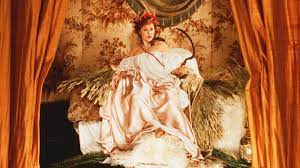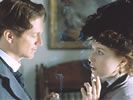Eye For Film >> Movies >> The House Of Mirth (2000) Film Review
The House Of Mirth
Reviewed by: Angus Wolfe Murray

You don't have to be Oscar Wilde to recognise that perception is more valuable than truth. Terence Davies' exquisite evocation of New York society at the beginning of the last century is confirmation indeed.
Based upon a novel by Edith Wharton, it tells of Lily Bart, a beautiful, intelligent lady of leisure, living on a small allowance from her aunt (Eleanor Bron), whose old-fashioned views of behavior would not tolerate even the most innocent of flirtations.

Lily has reached the age when she must marry. To stay independent too long tempts scandal. She should marry a rich man who needs an introduction into society. In that way, each would benefit. He provides financial support, she provides social legitimacy.
Lily won't follow the rules. She has many admirers, all weathy, some married. She refuses their advances. Her true affection is for Lawrence Selden (Eric Stoltz), a lawyer, who is conducting a clandestine affair with one of Lily's friends, the knowledge of which torments her.
"We resist the big temptations," she tells him later, "but it is the little ones that drag us down." By following her heart, rather than what is expected, she loosens the thread that ties her to a way of life she can no longer afford. She becomes a victim of circumstance and other people's desires. Her pride will not be compromised and, by refusing help, denies herself the luxury of salvation.
This is a long, slow and supremely well-written film. Costumes and furniture have as much importance as what is spoken at dinner tables. Words veil meaning. Truth is dressed in metaphor and played as a game.
Davies captures the lazy, effortless existence of the rich, as a child in summer might guddle minnows for the sake of something to kill. If another Wharton adaptation, The Age Of Innocence, appears racy by comparison, it is not to denigrate The House Of Mirth.
Davies is sensitive to emotion, rather than action. His interiors speak the language of another time and the clothes have an eloquence that compliments the look of the light.
Gillian Anderson is supremely self-contained, demonstrating a subtlety in her performance that mirrors the style of the film. Simply to watch her watching others from a box at the opera is to feel privileged. As one of the men says of Lily, "You are a wonderful spectacle."
Reviewed on: 14 Mar 2001




















